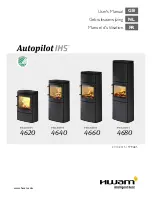
© 2007-2008 Broseley Fires Ltd
14A
HEARTH
REQUIREMENTS
It
is
essential
that
the
hearth
/
base
on
which
the
appliance
will
stand
is
strong
enough
to
support
the
weight
of
the
appliance
and
the
chimney
/
flue.
If
not,
independently
support.
It
must
be
level
and
made
of
a
suitably
robust,
non
combustible
material.
The
positioning
of
the
appliance
and
dimensions
of
the
hearth
must
comply
with
current
building
regulations.
A
constructional
hearth
needs
to
be
at
least
125mm
thick.
It
must
extend
at
least
150mm
each
side
of
the
appliance.
It
must
project
at
least
300mm
in
front
of
the
appliance.
A
change
in
level
of
at
least
12mm
is
advised
to
mark
the
perimeter.
There
should
be
a
50mm
air
space
under
the
constructional
hearth
if
combustible
material
is
present
OR
the
combustible
material
should
be
250mm
below
the
top
of
the
hearth.
The
superimposed,
decorative
hearth
is
laid
on
top
of
the
constructional
hearth.
STOVE
CLEARANCES
TO
FLAMMABLE
MATERIALS
•
The
minimum
distance
from
any
flammable
object,
or
one
that
is
sensitive
to
heat,
(furniture,
wood,
fabrics.
etc.)
and
from
materials
with
flammable
structure,
must
be
20
cm’s
to
the
rear
and
on
both
sides.
•
In
front
of
the
stove
there
must
not
be
any
flammable
object
or
building
material,
sensitive
to
heat
within
100
cm's.
•
Above
the
stove,
there
must
not
be
any
flammable
items
within
700mm.
•
Never
deposit
/
store
any
flammable
materials
near
the
stove.
STOVE
CLEARANCES
TO
NON
‐
FLAMMABLE
MATERIALS
•
The
minimum
distance
from
any
NON
FLAMMABLE
object,
or
one
that
is
NOT
sensitive
to
heat,
(stone
brick
slate
etc.)
and
from
materials
with
non
flammable
structure,
must
be
100
mm’s
to
the
rear
and
on
both
sides.
PLEASE
REFER
TO
BUILDING
REGULATIONS
“WALLS
ADJACENT
TO
HEARTHS”
for
further
information.
Where
the
hearth
abuts
a
wall
and
the
appliance
is
more
than
50mm
but
not
more
than
300mm
away:
•
The
thickness
of
the
wall
needs
to
be
at
least
75mm.
•
The
height
of
the
wall
needs
to
be
at
least
1.2M
above
the
hearth.
15.0
ADDITIONAL
VENTILATION
There
must
be
sufficient
free
air
for
combustion
into
the
room
where
the
appliance
is
installed.
Permanent
openings
or
vents
must
not
be
covered.
Vents
needs
to
be
positioned
carefully,
they
must
be
protected
from
direct
wind
conditions.
A
baffle
that
has
been
specially
designed
to
fit
over
the
vent
will
protect
it
from
the
effects
of
wind,
but
must
not
restrict
the
total
vent
area
and
must
be
secured
in
a
way
that
prevents
its
movement.
Regular
inspection
of
any
vents
is
critical
to
ensure
that
the
vent
has
not
become
restricted.
The
appliance
may
require
up
to
20
m
3
/hour
of
combustion
air.
The
natural
recirculation
of
air
must
be
guaranteed
by
having
permanent
ventilation
to
the
outside.
An
extractor
fan,
cooker
hood
or
similar
product,
installed
in
the
same
room,
or
in
a
room
nearby;
that
sucks
air
out
(aspirating);
may
negatively
affect
the
functions
of
your
cooker.
If
the
room
contains
more
than
one
appliance;
of
the
type
that
requires
combustible
air;
a
calculation
will
need
to
be
made
to
re
‐
calculate
the
permanent
air
vent
requirement.


































